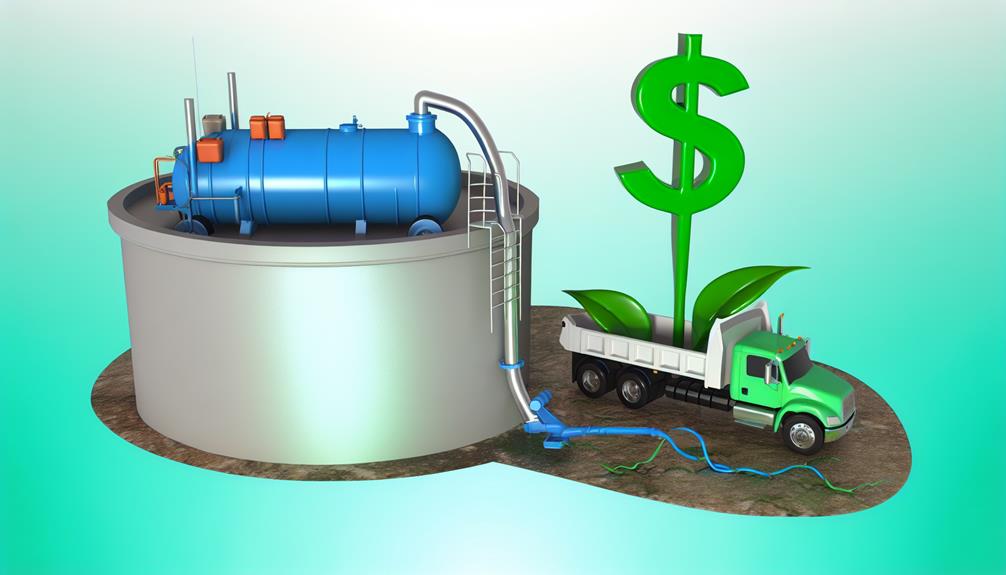Discover how to protect your septic system from breakdown with...
Read MoreYou & Your Septic Tank
Select Why Is Regular Septic Tank Pumping Cost-Effective?
Our professional septic service team offers comprehensive septic tank pumping services to keep your system running smoothly. Get a FREE Quote Today.

Select Why Is Regular Septic Tank Pumping Cost-Effective?
You might think that regular septic tank pumping is just another unnecessary expense, but have you ever considered how much a major septic system failure could set you back? Regularly scheduled septic tank maintenance isn’t just about keeping things running smoothly; it’s a strategic investment in your property’s long-term value.
Maintaining your septic system can prevent costly repairs and replacements down the road. But how much can you really save? And what does a proper maintenance schedule look like?
We’ll explore all of this and more, offering you a comprehensive guide to the true cost-effectiveness of regular septic tank pumping.
Key Takeaways
- Regular septic tank pumping prevents costly repairs and replacements.
- It improves the efficiency of the septic tank, leading to better functionality.
- Regular pumping prevents diseases caused by contaminated water supply.
- It protects the environment by preventing the release of untreated waste.
Understanding Septic Tank Pumping

Grasping the fundamentals of septic tank pumping is crucial for maintaining a healthy, functional wastewater system in your home. Pumping procedures and the understanding of septic system types are key factors in this maintenance process.
Your home’s septic system type is determined by factors such as soil type, groundwater level, and space availability. The most common system types are conventional, chamber, and mound. Each of these system types has specific pumping requirements that you need to adhere to for optimal performance.
Pumping procedures, on the other hand, involve removing the sludge, scum, and liquid from your septic tank and transporting it to a designated treatment facility. It’s a task best left to professionals who’ve the right equipment and training to handle the process safely and efficiently.
You should get your septic tank pumped every 3-5 years, depending on the size of your tank and the number of people in your household. Regular pumping prevents system failure, eliminates bad odors, and reduces the risk of groundwater contamination.
Importance of Regular Pumping
Undoubtedly, regular septic tank pumping plays a pivotal role in maintaining the overall health of your home’s wastewater system. It’s not just a routine chore; it’s an investment for the longevity of your system, impacting its functionality and efficiency.
Let’s delve into the pumping impacts and health implications:
- Pumping Impacts
- *Prevents Overflows*: By removing the sludge build-up, you’re preventing overflows, which can lead to costly repairs and replacements.
- *Improves Efficiency*: Regular pumping optimizes the performance of your septic tank, ensuring smooth flow of wastewater.
- Health Implications
- *Prevents Diseases*: Ignored septic tanks can contaminate your water supply with harmful bacteria and viruses, putting your family’s health at risk.
- *Protects Environment*: Regular pumping prevents the release of untreated waste into the environment, contributing to a healthier and safer community.
Frequency of Septic Tank Pumping

Determining the right frequency for septic tank pumping is essential to keep your wastewater system functioning at its best. Pumping procedures play a significant role in the maintenance of your septic system, affecting its longevity and reducing potential health implications.
Here’s a simple breakdown to guide your pumping schedule:
| Size of Household | Pumping Frequency |
|---|---|
| 1-2 people | Every 3-5 years |
| 3-5 people | Every 2-3 years |
| 6+ people | Every 1-2 years |
Please note, these are only rough estimates. Factors like the size of your septic tank, the amount of wastewater generated, and the volume of solids in the wastewater can alter this schedule.
For instance, if you’ve a larger household or if your household generates a large amount of wastewater, you might need to pump your tank more frequently. Conversely, smaller households or those that conserve water might extend the time between pumpings. It’s important to monitor your system’s performance and consult with a professional to determine the most appropriate schedule for your specific circumstances. Regular pumping will save you money in the long run by preventing costly repairs or replacements.
Cost Analysis of Septic Pumping
You’ll find that the cost of septic pumping can be broken down into three main categories:
- Initial pumping investment
- Long-term maintenance savings
- Avoiding major repair costs.
Understanding each of these elements will help you make an informed decision about your septic system maintenance.
Let’s take a closer look at each of these points to better understand the value of regular septic tank pumping.
Initial Pumping Investment
When considering the initial investment for septic tank pumping, it’s crucial to understand the cost factors involved, such as size of the tank, the rate of sludge buildup, and the service fees of your provider.
The pumping techniques and pumping equipment used greatly influence the overall cost. Here’s a brief breakdown of these factors:
- Pumping Techniques
- Standard Pumping: This method is less expensive but may not remove all the sludge.
- High-Pressure Pumping: Higher cost but ensures complete removal of waste.
- Pumping Equipment
- Basic Pump Trucks: Lower service cost but may take longer.
- Advanced Pump Trucks: Higher service cost but can handle larger tanks and tougher jobs more efficiently.
Long-Term Maintenance Savings
Investing in regular septic tank pumping can yield substantial savings in the long run, especially when you consider the high costs associated with major repairs and replacements. As you track expenses, you’ll notice a significant reduction in emergency maintenance costs. This preventative measure improves your system’s efficiency, preventing blockages and ensuring smooth operation.
A well-maintained system also extends the lifespan of your septic tank, further reducing your long-term expenses. It’s like a car; regular maintenance helps avoid expensive breakdowns. So, don’t overlook the importance of routine septic pumping.
In essence, it’s a cost-effective strategy that pays off in spades, providing you with improved efficiency and significant long-term maintenance savings. Be proactive, not reactive, and you’ll certainly see the financial benefit.
Avoiding Major Repair Costs
Over time, neglecting regular septic tank pumping can lead to severe damages that result in hefty repair costs. Emergency services costs can skyrocket as the need for urgent repairs arises.
Consider the following breakdown:
- Immediate Costs:
- Emergency Services Costs: These unexpected charges can be substantial. They include not just the repair costs but also the costs of emergency call-outs, which can be quite high.
- Health Hazards Mitigation: When your septic tank is damaged, it can leak and contaminate your property. You’ll need to spend money on professional cleanup services to mitigate health hazards.
Investing in regular septic tank pumping could prevent these expenses, making it a much more cost-effective option in the long run.
Benefits of Regular Pumping
You’ll find that regular septic tank pumping provides many advantages.
Notably, it can prevent costly major repairs and significantly enhance the longevity of your system.
Let’s explore how these benefits can make a substantial difference in maintaining your septic system.
Prevents Major Repairs
By ensuring regular septic tank pumping, you’re actively preventing the need for major, costly repairs in the future. This practice essentially enhances system efficiency and ultimately leads to repair avoidance.
- System Efficiency
- Regular pumping keeps your septic system running smoothly. It removes the build-up of solid waste, preventing blockages and maintaining the flow.
- This efficiency reduces the strain on the system, prolonging its lifespan and saving you money in the long term.
- Repair Avoidance
- With routine pumping, potential issues can be identified and addressed early on, before they turn into major problems.
- This proactive approach helps you avoid expensive emergency repairs and system replacements.
Enhances System Longevity
Regular septic tank pumping isn’t just about preventing repairs; it’s also a crucial step in boosting your system’s longevity.
Over time, your septic tank accumulates solids that, if left unchecked, can cause severe damage, reducing your system’s lifespan significantly.
Pumping benefits aren’t limited to avoiding immediate issues; they also ensure your system’s efficiency for many more years.
Long-Term Savings From Regular Pumping

Often, homeowners overlook the long-term financial benefits that regular septic tank pumping can provide. Not only does this maintenance task safeguard your property’s sanitation, it also results in significant cost savings over time. Employing proper pumping methods and adhering to septic regulations can prevent costly repairs or even full system replacements in the future.
You’ll find that the benefits of regular pumping extend beyond mere compliance with septic regulations. In fact, your wallet will thank you in the long run. To better understand these benefits, consider the following:
- Preventive Maintenance:
- Regular pumping lowers the risk of system failure, which can lead to very expensive repairs.
- It helps detect potential problems early on, before they become severe and costly.
- Compliance with Septic Regulations:
- Avoiding fines and penalties associated with non-compliance. These fines can often be hefty.
Case Studies on Septic Tank Maintenance
Let’s delve into some specific cases that highlight the importance and benefits of regular septic tank maintenance.
Consider a residential community in the Midwest. As a result of neglecting maintenance schedules, they faced a significant environmental impact. Their septic tanks overflowed, contaminating local water sources and causing public health issues. However, once they adopted a regular pumping schedule, the situation drastically improved. Not only were they able to prevent further environmental damage, but they also saved a considerable amount on potential cleanup costs.
Now, let’s turn to a small business in the South. Initially, they chose to save money by forgoing regular maintenance. However, an unexpected septic tank failure led to a temporary shutdown, resulting in lost revenue far beyond the cost of routine maintenance. After this incident, they committed to a proactive maintenance schedule, which drastically reduced their chances of another costly disruption.
These cases illustrate that regular septic tank maintenance isn’t just about avoiding unpleasant odors or messes. It’s a cost-effective measure that safeguards your health, protects the environment, and prevents costly emergencies.
Conclusion
Just like a well-oiled machine, your septic system needs regular maintenance to run smoothly.
By regularly pumping your septic tank, you’re investing in its longevity, preventing costly repairs, and maintaining the health of your property.
It’s economical in the long run, like saving on expensive car repairs by regularly changing the oil.
Don’t let short-term costs deter you – timely septic tank pumping is a cost-effective strategy for long-term savings.
You may also like...
Why Are DIY Fixes Essential for Septic Tank Pumping?
Tap into the importance of DIY fixes for septic tank...
Read MoreUnveiling the Average Costs of Septic Tank Pumping
Master the mysteries of septic tank pumping costs and avoid...
Read More
The Best Septic Tank Pumping Services Near You

Answer Some Questions
Let us know about your needs so we can find you the right septic tank pros.

Get Quotes
We will put you in touch with the right septic tank pros for your job and location.

Hire Right
Compare quotes, message or call pros, and hire only when ready.



